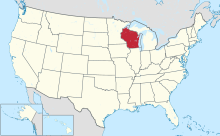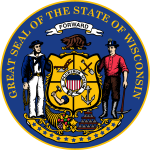Presidential elections in Wisconsin Number of elections 44 Voted Democratic 19 Voted Republican 25 Voted other 1[a] Voted for winning candidate 34 Voted for losing candidate 10
Since Wisconsin 's admission to the Union in May 1848,[1] 1924 , Robert M. La Follette became the only third-party presidential candidate to win in Wisconsin, taking 53.96% of the popular vote. Since 1988 , Wisconsin has leaned towards the Democratic Party in presidential elections, although Republican Donald Trump won the state by a margin of 0.77 percentage points. Wisconsin is tied with Michigan and Pennsylvania for the longest active streak of voting for the winning candidate, last voting for a losing candidate in 2004 .
In the 2020 presidential election , Democrat Joe Biden won Wisconsin, defeating Trump by 0.62 percentage points. During the 2021 United States Electoral College vote count , 36 members of the House of Representatives objected to the certification of Wisconsin's electoral votes based on unsupported claims of election fraud, but the objection failed because it was not joined by a senator.[2]
Elections
Key for parties
Note – A double dagger (‡) indicates the national winner.
1848 to 1856
Election of 1860
The election of 1860 was a complex realigning election in which the breakdown of the previous two-party alignment culminated in four parties each competing for influence in different parts of the country. The result of the election, with the victory of an ardent opponent of slavery , spurred the secession of eleven states and brought about the American Civil War .
1864 to present
Presidential elections in Wisconsin from 1864 to present
Year
Winner
Runner-up
Other candidate[b]
EV
Ref.
Candidate
Votes
%
Candidate
Votes
%
Candidate
Votes
%
1864
Abraham Lincoln (R) ‡
83,458
George B. McClellan (D)
65,884
–
–
–
8
1868
Ulysses S. Grant (R) ‡
108,920
Horatio Seymour (D)
84,708
–
–
–
8
1872
Ulysses S. Grant (R) ‡
105,012
Horace Greeley (D)
86,390
Charles O'Conor (SOD)
853
10
1876
Rutherford B. Hayes (R) ‡
130,668
Samuel Tilden (D)
123,927
Peter Cooper (GB)
1,509
10
[17]
1880
James A. Garfield (R) ‡
144,406
Winfield S. Hancock (D)
114,650
James B. Weaver (GB)
7,986
10
1884
James G. Blaine (R)
161,155
Grover Cleveland (D) ‡
146,447
John P. St. John (PRO)
7,651
11
1888
Benjamin Harrison (R) ‡
176,553
Grover Cleveland (D)
155,232
Clinton B. Fisk (PRO)
14,277
11
1892
Grover Cleveland (D) ‡
177,325
Benjamin Harrison (R)
171,101
John Bidwell (PRO)
13,136
12
1896
William McKinley (R) ‡
268,135
William Jennings Bryan (D)
165,523
Joshua Levering (PRO)
7,507
12
1900
William McKinley (R) ‡
265,760
William Jennings Bryan (D)
159,163
John G. Woolley (PRO)
10,027
12
1904
Theodore Roosevelt (R) ‡
280,314
Alton B. Parker (D)
124,205
Eugene V. Debs (S)
28,240
13
1908
William Howard Taft (R) ‡
247,744
William Jennings Bryan (D)
166,662
Eugene V. Debs (S)
28,147
13
1912
Woodrow Wilson (D) ‡
164,230
William Howard Taft (R)
130,596
Theodore Roosevelt (PR-1912)
62,448
13
1916
Charles E. Hughes (R)
220,822
Woodrow Wilson (D) ‡
191,363
Allan L. Benson (S)
27,631
13
1920
Warren G. Harding (R) ‡
498,576
James M. Cox (D)
113,422
Eugene V. Debs (S)
80,635
13
1924
Robert LaFollette (PR-1924)
453,678
Calvin Coolidge (R) ‡
311,614
John W. Davis (D)
68,115
13
1928
Herbert Hoover (R) ‡
544,205
Alfred E. Smith (D)
450,259
Norman M. Thomas (S)
18,213
13
1932
Franklin D. Roosevelt (D) ‡
707,410
Herbert Hoover (R)
347,741
Norman M. Thomas (S)
53,379
12
1936
Franklin D. Roosevelt (D) ‡
802,984
Herbert Hoover (R)
380,828
William Lemke (Union)
60,297
12
1940
Franklin D. Roosevelt (D) ‡
704,821
Wendell L. Willkie (R)
679,206
Norman M. Thomas (S)
15,071
12
1944
Thomas E. Dewey (R)
674,532
Franklin D. Roosevelt (D) ‡
650,413
Norman M. Thomas (S)
13,205
12
1948
Harry S. Truman (D) ‡
647,310
Thomas E. Dewey (R)
590,959
Henry A. Wallace (PR-1948)
25,282
12
1952
Dwight D. Eisenhower (R) ‡
979,744
Adlai Stevenson (D)
622,175
Vincent Hallinan (PR-1948)
2,174
12
1956
Dwight D. Eisenhower (R) ‡
954,844
Adlai Stevenson (D)
586,768
T. Coleman Andrews (C)
6,918
12
1960
Richard M. Nixon (R)
895,175
John F. Kennedy (D) ‡
830,805
Farrell Dobbs (SWP)
1,792
12
1964
Lyndon B. Johnson (D) ‡
1,050,424
Barry Goldwater (R)
638,495
Clifton DeBerry (SWP)
1,692
12
1968
Richard M. Nixon (R) ‡
809,997
Hubert Humphrey (D)
748,804
George Wallace (AI)
127,835
12
1972
Richard M. Nixon (R) ‡
989,430
George McGovern (D)
810,174
John G. Schmitz (A)
47,525
11
1976
Jimmy Carter (D) ‡
1,040,232
Gerald R. Ford (R)
1,004,987
Eugene J. McCarthy (I)
34,943
11
1980
Ronald Reagan (R) ‡
1,088,845
Jimmy Carter (D)
981,584
John B. Anderson (I)
160,657
11
1984
Ronald Reagan (R) ‡
1,198,584
Walter Mondale (D)
995,740
David Bergland (LI)
4,883
11
1988
Michael Dukakis (D)
1,126,794
George H. W. Bush (R) ‡
1,047,499
Ron Paul (LI)
5,157
11
[73]
1992
Bill Clinton (D) ‡
1,041,066
George H. W. Bush (R)
930,855
Ross Perot (I)
544,479
11
[75]
1996
Bill Clinton (D) ‡
1,071,971
Bob Dole (R)
845,029
Ross Perot (RE)
227,339
11
[77]
2000
Al Gore (D)
1,242,987
George W. Bush (R) ‡
1,237,279
Ralph Nader (G)
94,070
11
[79]
2004
John Kerry (D)
1,489,504
George W. Bush (R) ‡
1,478,120
Ralph Nader (RE)
16,390
10
[81]
2008
Barack Obama (D) ‡
1,677,211
John McCain (R)
1,262,393
Ralph Nader (I)
17,605
10
[83]
2012
Barack Obama (D) ‡
1,620,985
Mitt Romney (R)
1,407,966
Gary Johnson (I)
20,439
10
[84]
2016
Donald Trump (R) ‡
1,405,284
Hillary Clinton (D)
1,382,536
Gary Johnson (LI)
106,674
10
[85]
2020
Joe Biden (D) ‡
1,630,866
Donald Trump (R)
1,610,184
Jo Jorgensen (LI)
38,491
10
[86]
Graph

